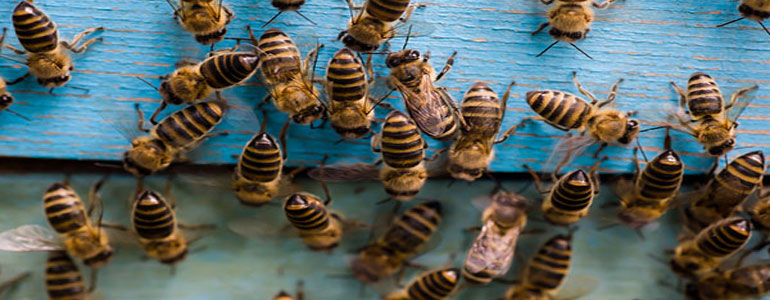
Honey bees are eco-friendly pollinators and their natural honey tastes very sweet. But honey bees tend to form colonies and hives on the walls and ceilings of homes and offices can be a serious threat. A honey bee's sting is very painful and leads to stressful and allergic reaction in many people. The big hives can also damage the ceiling or wall structure due to seepage and stained insulation. Abandoned hives tend to attract other pests like ants, rodents, and flies. Our state of art Honey Bee service in Belapur takes all these significant factors into consideration. Our Honey Bee service in Belapur
The bee pollinates fruit trees, flowers, and plants to make honey to feed the colony. Bees can create a hive or swarm (sometimes as many as 50,000 bees) in a rafter, shed, tree, or bush. Bee stings can be deadly to infants, the elderly, and persons allergic to bee venom. Bees are beneficial insects, however if their nest is located in or close to an occupied structure, then control is warranted.
If the colony is well established, there are further issues associated with killing the colony. Unattended brood can also rot and become very odorous. Unattended honey stores can absorb moisture and ferment, creating gas that causes the capping holding honey in the cells to burst.Honey then seeps through the drywall, leading to large amounts of clean-up and expensive replacement. If pesticides were used to kill the bees, then the honey, wax and, dead bees are contaminated and must be handled as hazardous waste.
Honey bee colonies in wall or attic voids are a much more serious problem than yellow jacket wasps. Yellow jacket colonies are annual and the wasps will disappear in the winter with or without treatment. Honey bee nests may last for many years without treatment and will contain honey stored inside the walls. The honey can ruin walls and ceilings if it is not removed.
If the colony is well established, there are further issues associated with killing the colony. Unattended brood can also rot and become very odorous. Unattended honey stores can absorb moisture and ferment, creating gas that causes the capping holding honey in the cells to burst. Honey then seeps through the drywall, leading to large amounts of clean-up and expensive replacement.